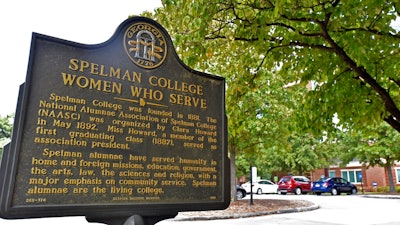
CHICAGO (AP) — A new center for training Black entrepreneurs will be opening in Atlanta as part of a collaboration announced Monday between Spelman College, Morehouse College and an advocacy organization made up of business leaders.
The Center for Black Entrepreneurship is expected to start operating for the fall 2021 semester. Details of the collaboration were shared with The Associated Press ahead of the announcement.
“In 2020 we saw an acknowledgement from many in the investor community that there needs to be a change, that we need to take a look at these barriers and how they are preventing talented aspiring Black entrepreneurs from reaching their full potential,” said David Clunie, executive director of the Black Economic Alliance, the advocacy group involved. “We need to give them the education, resources and opportunities they need to really succeed.”
The center will be housed in Spelman's new Center for Innovation & the Arts as well as a new building at Morehouse. It will include a core curriculum on business development, speakers, mentorship opportunities and chances to connect with investors for the historically Black colleges and universities that make up the Atlanta University Center Consortium: Spelman College, Morehouse College, Morehouse School of Medicine and Clark Atlanta University.
Spelman is a private women’s liberal arts college with 2,097 students, and Morehouse is a private men’s liberal arts college with 2,200 students, according to the colleges' websites.
In addition to the in-person instruction for students at these HBCUs, an online program also will be available to the general public and provide certifications in project management, cybersecurity and other business-related topics.
Morehouse President David A. Thomas said the new center builds on a long history of entrepreneurial spirit at these HBCUs and continues the schools' legacies of providing opportunities for economic and social mobility for their students. He said he hopes the center will serve as a model for other HBCUs.
“What I envision is for other historically Black colleges to join the CBE network so that these entrepreneurship centers are developed and connected across the country," he said. “Collaboration makes these programs stronger.”
James Johnson Jr., a professor of strategy and entrepreneurship in the UNC Kenan-Flagler Business School in Chapel Hill, North Carolina, said a well-planned entrepreneurship center can be a first step toward addressing the systemic barriers Black entrepreneurs face. Johnson said Black entrepreneurs face reduced access to capital, networking opportunities and generational wealth that could allow them to take the risks often necessary in starting a business. They also face racism when applying for loans or finding investors, he said.
These are the kinds of inequities Spelman President Mary Schmidt Campbell and others behind the Spelman and Morehouse center hope the facility will help address through its mission of supporting Black entrepreneurs and working to close the wealth gap between Black and white Americans.
“These barriers have existed for decades," Campbell said. "You're asking Black entrepreneurs to start a mile back from the starting line. What we intend to do with the center is to propel them forward.”
But Johnson said there’s more work to do, especially in supporting older entrepreneurs who may not have the same access to university-based centers.
“I’m happy to see these centers, but we can’t stop there,” he said. “The center has to be within a larger ecosystem that supports Black business for these entrepreneurs to thrive.”
It's an opportune time to launch the center given the increased interest in Black-owned businesses amid the COVID-19 pandemic, which has caused many to close, and the recent racial reckoning, Clunie said.
“You see more urgency within the investment community to support Black businesses during this time and to counteract decades of systemic racism that has been highlighted last year through the pandemic,” he said. “This conversation is way overdue, but it’s the perfect time to have it.”
The center will be funded in part by a $10 million grant from Bank of America to support curriculum development, faculty recruitment and co-curricular programming as part of its $1 billion racial equity fund. Ebony Thomas, a Bank of America racial equity executive, agreed the pandemic “has highlighted and magnified the dire need for work like this.”
“For America to thrive, we need to support Black businesses and entrepreneurship. And we need to do it now,” said Thomas, a graduate of North Carolina Agricultural and Technical State University, an HBCU.
“At a center like this, a student’s dreams can be realized,” she continued. “They can find a community behind them to empower them and give them the support they need. The impact is immediate. And then years from now, that new business owner will be able to reinvest in their community and continue that legacy.”





















